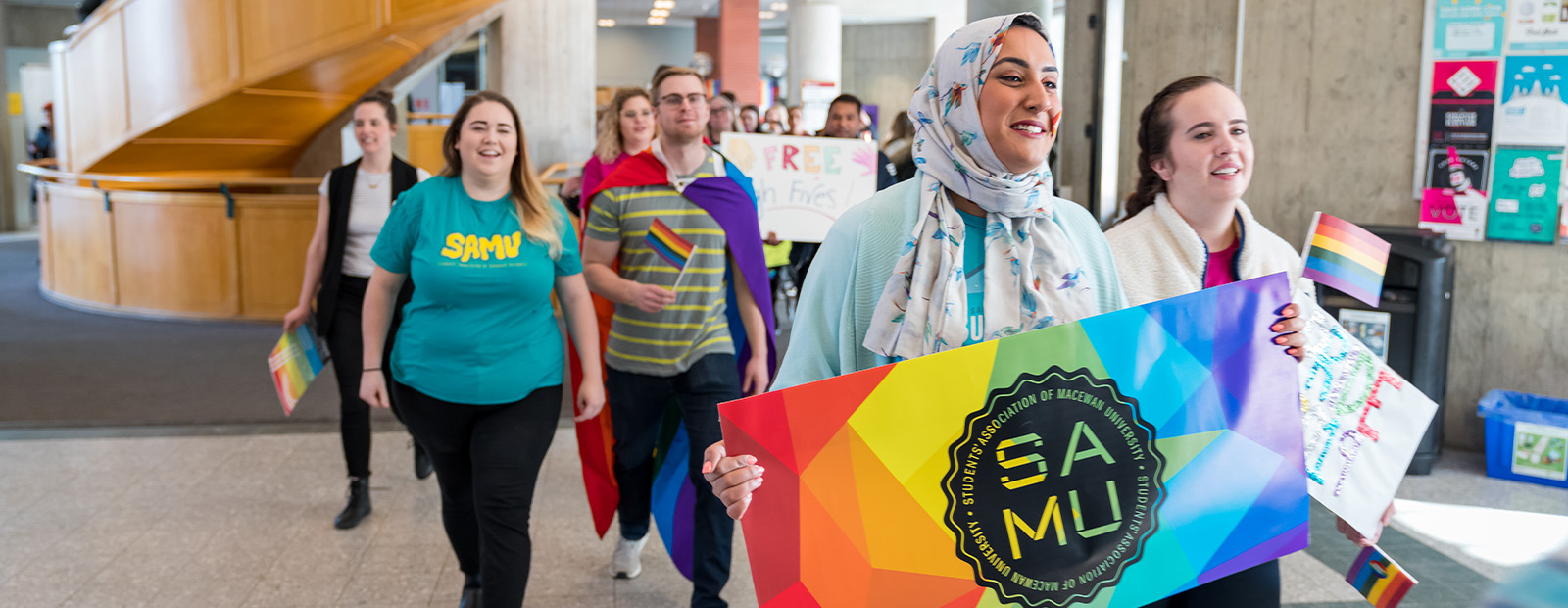When considering Pride and queer history, it’s easy to get caught up in the hardships – the Stonewall Riots, the AIDS crisis, the knowledge that we’ve come so far yet still have work to do to ensure safety and equality for communities. All of this makes it easy to miss the happiness and positivity brought about by people expressing themselves as who they truly are.
To highlight that positivity, MacEwan’s Pride Week is turning the focus to an exploration and celebration of Queer Joy.
“Queer joy is different than happiness as a momentary event. It’s something that springs from a deeper well because it happens despite oppression and tragic narratives that are pushed on the community. Queer joy is an act of resistance and of rebellion in a society that wants to tell your story for you instead of allowing you to tell it yourself,” says Jessica Scalzo, program coordinator for the Centre for Sexual and Gender Diversity (CSGD). She adds that it’s a unique type of emotion that happens within a group of peers who understand one another’s experiences without requiring justification or explanation. It isn’t exclusive to the queer community, and can be shared by others who participate in Pride events, push back against societal norms and support queer and trans rights.
Queer joy was chosen as the week’s theme as a way to help shake off the isolation of the pandemic. Scalzo says that having a community here on campus is important now more than ever, and that community members need a place to relax and feel safe.
“Having to be resilient all the time is really tiring,” she says. “We wanted to create a community where joy is a given.”
The theme ties into assistant professor of Sociology and Gender Studies Dr. Jessica (JJ) Wright’s current research on the topic of queer sexual joy, which is some of the earliest of its kind. “It is a burgeoning field. The people who are writing about this are theorizing what queer joy is, naming it, defining it and researching it,” she says.
Dr. Wright's own research into queer joy comes after dedicating their PhD thesis to studying the need for trauma-informed models of consent and consent education. During her time researching sexual trauma, she found a connection between survivors and queer sexual joy.
The majority of participants in her PhD study were from a marginalized community. She found that survivors who had had sexual encounters with cisgendered, heterosexual men and had also been with queer or trans people had their needs accommodated much more by the queer and trans people, especially if those individuals were also survivors.
She decided to look into why those communities are able to better navigate sexual consent and ensure that their partners are both comfortable and engaged. She chose to look at queer and trans communities specifically, and to research how respect, nuance and consent is approached among members of these groups.
“I wanted to centre on queer joy because it flies in the face of cis heteronormativity. It says, ‘we will not buy into these toxic power dynamics. We will not live our lives according to these societal confines around gender roles and sexual norms. But instead, we will live in ways that are about connectedness, humanity, pleasure and reciprocity.’”
Though the research into queer joy is new, Dr. Wright notes that 2SLGBTQIA+ communities have joyful roots that stretch back for generations. “There’s so much we can learn from queer elders about how queer joy has not only helped them to survive but to thrive. We need to understand queer and trans communities for the ways that they are living their lives in beautiful ways, connecting with communities and are happy and joyful in addition to struggling with difficult systemic issues.”
Dr. Wright is bringing that understanding to Pride Week, where they will host Crafting Queer Joy on March 8. The event is informal, but offers an opportunity to learn about how others see queer joy through a group discussion, as well as the chance to create a collage of those joyous outlooks.
Scalzo adds that the event is an opportunity to share thoughts and ideas that might help others in their journeys, as well as creating reminders for their future selves. “People are able to create something to take home that reflects the joy that they feel here and now, and that they can look back on when times are harder. It’s a reminder of our ability to create beauty out of chaos and that we belong to this broad community of diverse folks.”
For more information about Pride Week 2023 and a full list of events, visit MacEwan.ca/PrideWeek.
